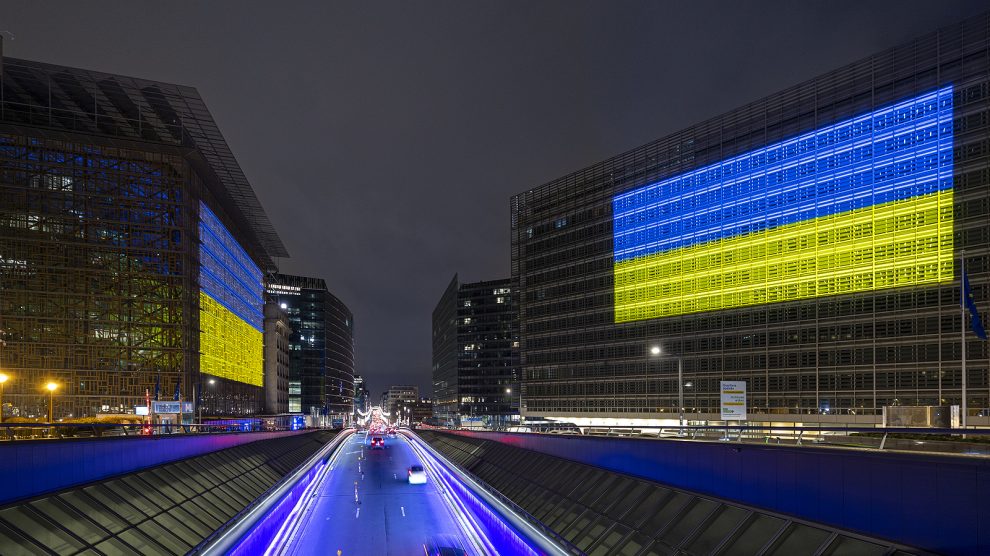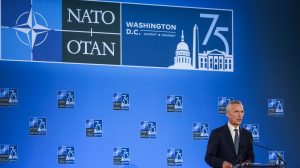Catch up quickly with the stories from Central and Eastern Europe that matter.
Russia’s war on Ukraine
The European Council agreed to open accession talks with Ukraine and Moldova, Council President Charles Michel announced on Thursday evening.
Michel made the announcement during the two-day summit in Brussels amid worries that Hungary’s prime minister, Viktor Orbán, would block the start of the negotiations. Later on Thursday night, however, Orbán reportedly blocked 50 billion euros of EU aid for Ukraine.
The Council also granted candidate status to Georgia. The EU will open negotiations with Bosnia and Herzegovina after progress in membership criteria is reached, Michel added.
“A clear signal of hope for their people and for our continent,” Michel commented.
The decision came after Orbán chose to leave the room during the debate to allow agreement, according to people briefed on the talks.
Ukrainian President Volodymyr Zelensky wrote in response to the EU move on social media platform X: “This is a victory for Ukraine. A victory for all of Europe. A victory that motivates, inspires, and strengthens.”
Moldova’s president, Maia Sandu, meanwhile said that, “We’re committed to the hard work needed to become an EU member. Moldova is ready to rise to the challenge.”
Russia launched a massive missile attack on Kyiv in the early hours of Wednesday in an apparent show of strength, minutes after Zelensky met Joe Biden for talks in Washington.
Ukraine’s air defences shot down all 10 Russian missiles targeting the capital at 3am local time. Falling debris caused extensive damage to four neighbourhoods on the eastern bank of the Dnipro River and at least 53 people were injured in what Zelenskiy described as a “heinous” crime.
Kyiv’s mayor, Vitaly Klitschko, posted video footage of the destruction. Ballistic missile fragments had fallen in the yard of an apartment building, damaging balconies and setting fire to a flat on the sixth floor. A kindergarten was badly damaged. Several parked cars had been set alight, and windows in properties blown out.
Kyivstar, Ukraine’s largest mobile and internet provider, said Russian hackers were responsible for shutting down its services on Tuesday.
More than 24.3 million Kyivstar customers lost phone reception, banks reported disruptions to their services and Ukrainians in the country’s eastern war zone were left without a connection. State-owned Privatbank, Ukraine’s largest bank, also reported issues at terminals connected with Kyivstar.
“Unfortunately, the war with Russia has several dimensions. One of them is in cyberspace,” said Kyivstar CEO Oleksandr Komarov in a video statement. “Today Kyivstar became the target of a powerful hacker attack, as a result of which mobile and internet services became temporarily unavailable.”
Stable mobile services have been crucial for Ukraine since Moscow launched its full-scale invasion in February 2022, as smartphones have been used to send air raid alerts and donations to the army, and to transfer money to Ukrainians living in Russian-occupied zones.
The International Finance Corporation (IFC) and the European Bank for Reconstruction and Development (EBRD) this week announced a new investment in Ukrainian-founded edtech firm Preply.
Preply is a leading global online language learning platform, and it is hoped that the investment will help bolster Ukraine’s tech sector and pave the way for more innovative solutions, aiding economic recovery.
IFC and EBRD are collectively investing 10 million US dollars in partnership with Horizon Capital, a prominent growth equity fund manager in Ukraine and Moldova, and a longstanding client of both IFC and EBRD. The investment is part of a 70 million US dollars funding initiative led by Horizon Capital.
Despite Ukraine experiencing a drastic 29.1 per cent drop in its GDP in 2022, its technology sector generated a remarkable 7.3 billion US dollars in annual export earnings, exceeding expectations and providing crucial support to the country’s economy. New investments are crucial for businesses and job creation in Ukraine’s high-risk environment.
Other news from the region
Poland’s new prime minister, Donald Tusk, and his cabinet members took office on Wednesday after they were sworn in by the president, Andrzej Duda, marking the end of eight tumultuous years of rule by a national conservative party, Law and Justice. The swearing-in of the pro-European Union government, the final step in a transition of power, took place during a ceremony at the presidential palace in Warsaw. Tusk, 67, returns to the prime minister’s post after a nine-year spell during which he held a top EU position and was the Polish opposition leader.
Meanwhile, on Tuesday the European Court of Human Rights said that Poland has violated the right to a private life by failing to offer legal recognition for same-sex couples, putting pressure on Tusk’s new government to quickly change the law. “The Court considered that the Polish State had failed to comply with its duty to ensure that the applicants had a specific legal framework providing for the recognition and protection of their same-sex unions,” it said in a statement. Tusk had said during the election campaign that his party would introduce a provision for same-sex partnerships.
Hungary’s parliament on Tuesday passed a package of laws to curb foreign influence, which critics fear could be used to crack down on dissent against nationalist Prime Minister Viktor Orbán’s government. The “defence of national sovereignty” law package is seen as the latest attempt by Orbán to silence critical voices ahead of next year’s European Parliament and local elections. The laws were adopted by a large majority in parliament which is dominated by Orbán’s Fidesz party, according to the parliament’s website.
Estonian leaders are assessing options for making the Baltic country, known for its cyber-savvy start-up scene, into a producer of ammunition for the European market, according to a senior defence official. “Ukraine needs more ammunition and countries have lots of stocks to refill as well,” Tuuli Duneton, undersecretary for defense policy, told Defense News in an interview. Estonia depends heavily on imports when it comes to military goods, including ammunition. The government will need a constant supply of rounds for the weapons purchases lined up in the aftermath of Russia’s invasion of Ukraine.
Special prosecutors in Albania asked lawmakers on Tuesday to lift the parliamentary immunity of former president and prime minister Sali Berisha to allow for him to be placed under house arrest. Seventy-nine year-old Berisha, the pre-eminent political figure in Albania after the fall of communism in the early 1990s and again in the 2000s, was charged in October alongside his son-in-law with “passive corruption” dating to 2008. Claiming he is the victim of a political vendetta, Berisha has since flouted a so-called ‘security measure’ requiring him to report to police twice a month.
An appeals court in Moldova’s capital this week annulled a decision that banned hundreds of candidates from an alleged pro-Russia political party from participating in an electoral race days ahead of a nationwide ballot. The Chisinau Court of Appeal overturned the ban on the Chance party that had been enforced by Moldova’s Commission for Exceptional Situations on November 3—two days before local elections. The ban removed about 600 candidates from the ballot in the country of about 2.5 million people. The party had legally challenged the ban.
Azerbaijan and Armenia traded prisoners-of-war at their border on Wednesday in a step towards normalising their relations after Azerbaijan achieved a decisive breakthrough in their decades-old conflict. The exchange involved the release by Azerbaijan of 32 Armenians mostly captured in late 2020. In return, Armenia handed over two Azerbaijani soldiers held since April 2023. Russia’s TASS news agency reported earlier on Wednesday that Armenia and Azerbaijan were also discussing the withdrawal of troops from their shared border, though it said no decision had yet been taken.
The Bulgarian government this week began demolishing the iconic Soviet Army monument that has dominated much of the landscape in the centre of the capital Sofia for nearly 70 years. “We are planning to hold a public procurement for the restoration of the monument, and then the figures will be exhibited in the Museum of Socialist Art,” said Sofia’s regional governor, Sofia Vyara Todeva. The destruction of the monument has been sought by the pro-European liberal section of Bulgarian society since the collapse of the totalitarian regime in 1989.
Unlike many news and information platforms, Emerging Europe is free to read, and always will be. There is no paywall here. We are independent, not affiliated with nor representing any political party or business organisation. We want the very best for emerging Europe, nothing more, nothing less. Your support will help us continue to spread the word about this amazing region.
You can contribute here. Thank you.







Add Comment